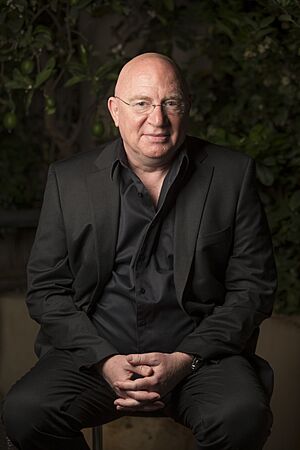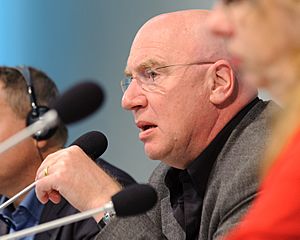Carlo Strenger facts for kids
Carlo Strenger (born July 16, 1958 – died October 25, 2019) was a smart and influential person from Switzerland and Israel. He was a psychologist and philosopher. He also worked as a professor at Tel Aviv University.
Strenger was a senior researcher at the Center for the Study of Terrorism at John Jay College. He also advised the Sigmund Freud Foundation in Vienna. His work often looked at how globalization affects our sense of who we are and what matters in life.
He wrote columns for newspapers like Haaretz and Neue Zürcher Zeitung. In these articles, he shared his ideas on the Middle East conflict. He also wrote about European politics and culture. He always shared a liberal point of view.
Contents
- Early Life and Learning Journey
- Understanding the Mind: Carlo Strenger's Work in Psychoanalysis
- How Globalization Shapes Us: Strenger's Research
- Thinking About Midlife Changes
- The Fear of Insignificance: Finding Meaning Today
- Jewish Identity and Being a World-Citizen
- Carlo Strenger's Political Views
- Books by Carlo Strenger
Early Life and Learning Journey
Carlo Strenger was born in Basel, Switzerland. His mother was from Belgium and his father was Swiss. He grew up in an Orthodox Jewish family. As a teenager, he stopped believing in his religion and became an atheist. He felt this change was a very important part of his life.
After high school, he spent a year at a yeshiva (a Jewish school). Then he started studying psychology and philosophy in Zürich, Switzerland. At 19, he moved to Israel. He continued his studies at the Hebrew University of Jerusalem. He earned his Ph.D. in 1989. Later, he moved to Tel Aviv, where he lived with his wife, Julia Elad-Strenger. She is also a psychologist.
Understanding the Mind: Carlo Strenger's Work in Psychoanalysis
From 1986 to 2000, Strenger mainly studied psychoanalysis. This is a way of understanding how our minds work. His first book, Between Hermeneutics and Science, said that psychoanalysis needed more scientific proof. He believed it should connect with other sciences to stay important.
He continued these ideas in his book Freud's Legacy in the Global Era (2016). He thought psychoanalysis should also consider how much society and culture have changed. This includes the effects of globalization on people's lives.
In the 1990s, he worked as a therapist in Tel Aviv. He combined ideas from psychoanalysis and existentialism in his work. Existentialism is a philosophy that focuses on human existence and freedom. He shared his ideas in Individuality, the Impossible Project (1998). Some experts thought this book was very important. They liked his idea that our "self" is something we create, not something already fixed.
How Globalization Shapes Us: Strenger's Research
From 2000 onwards, Strenger focused on how globalization affects who we are. Globalization means how countries and people around the world become more connected. He wrote many papers and two books on this topic. These books were The Designed Self and The Fear of Insignificance. He often gave talks about globalization and being a "world-citizen."
In The Designed Self (2004), he wrote about how life was different for "Generation X." This generation grew up without many old rules. But they faced a fast-changing world and a lot of pressure to succeed. Strenger said that for them, life felt like an endless experiment. They wanted amazing careers and to try new lifestyles. He noticed they often looked to popular culture for guidance.
Some people thought this book was a fresh way to understand a generation shaped by global markets. Others felt his ideas were too broad and didn't offer one clear theory.
Thinking About Midlife Changes
Strenger also looked at other effects of our changing world. He suggested we should rethink "midlife." This is the period in the middle of our lives. Since people live longer now, he believed changing careers or life paths in midlife should be normal. He called this "active self-acceptance." It means honestly looking at your strengths and weaknesses to make good choices.
The Fear of Insignificance: Finding Meaning Today
In his book The Fear of Insignificance: Searching for Meaning in the Twenty-first Century, Strenger talked about a new kind of person. He called them Homo Globalis. This person is always connected to global news and entertainment. He said our culture celebrates huge achievements. It tells us that "everything is possible," like the slogan "Just do it!"
Strenger argued that it's hard for Homo Globalis to feel good about themselves. This is because they compare their lives to the amazing success stories shown in the media. He suggested that popular spiritual ideas often don't help people find lasting happiness.
As a solution, Strenger suggested "active self-acceptance." This means finding out who you truly are. He believed that learning and developing a strong worldview can give people a stable sense of meaning.
This book was translated into many languages. Strenger also wrote about these ideas in a blog called Homo Globalis for Psychology Today.
Jewish Identity and Being a World-Citizen
Strenger was very interested in modern Jewish identity. He explored how people can feel connected to a global community. He wondered how people could care about others beyond their own culture. He thought that the development of modern Jewish Universalism was a good example. He mentioned people like Sigmund Freud and Hannah Arendt as examples.
In his book Israel, Einführung in ein schwieriges Land (Israel, Introduction to a Difficult Country), he wrote that Jewish Universalist ideas sometimes clash with nationalist ideas in Israeli politics.
Carlo Strenger's Political Views
Strenger was involved in Israeli politics from the late 1990s. He often spoke about the Middle East conflict. He used his understanding of psychology to analyze these issues.
His book Israel, Einführung in ein schwieriges Land looked at Israeli politics and society. Strenger believed Israel was still figuring out its identity. He felt that issues like the role of religion in the state were still unsolved. He also discussed the complex relationship between Europe and Israel. He thought the Middle East conflict was hard to solve because different religions claim to have the only truth.
From 2007, Strenger wrote columns for Haaretz, a leading Israeli newspaper. He also wrote for Neue Zürcher Zeitung. Sometimes, his articles appeared in The Guardian and The New York Times.
Strenger supported the two-state solution. This idea suggests creating a Palestinian state alongside Israel. He often criticized Israel's settlement policies. He felt Israel missed chances for peace. However, he also became doubtful if the two-state solution could still happen. This was because Israel's politics moved more to the right. He also felt Palestinian leadership was not effective.
He also criticized Palestinians for always seeing themselves as victims. He asked for responsible Palestinian leaders to make real peace offers. He strongly opposed efforts to question Israel's right to exist.
Strenger believed Israel should be more like France or the US. These countries keep religion separate from the government. He thought this would help Israel avoid constant conflicts.
He described himself as a "classical European Liberal." He felt his political ideas were based on this liberal way of thinking. Some critics from the Israeli right wing, however, called him extreme left. Strenger supported a liberal form of Zionism. This is a movement that supports the development and protection of a Jewish nation in what is now Israel.
He believed that certain Israeli political parties were committed to Israel being a Western, liberal democracy. This means a country with separation of state and religion. It also means equal rights for all citizens, no matter their background.
Carlo Strenger passed away on October 25, 2019, in Tel Aviv.
Books by Carlo Strenger
Carlo Strenger wrote many scientific papers and eleven books. These books covered topics like psychoanalysis, politics, and what it means to be an individual in a global world. They were translated into many languages.
- Diese verdammten liberalen Eliten. Wer sie sind und warum wir sie brauchen. Suhrkamp-Verlag, Edition Suhrkamp, Berlin 2019.
- Abenteuer Freiheit – Ein Wegweiser für unsichere Zeiten. Suhrkamp, Berlin 2017.
- Freud’s Legacy in the Global Era. Routledge, London 2015.
- Zivilisierte Verachtung – Eine Anleitung zur Verteidigung unserer Freiheit. Suhrkamp, Berlin 2015.
- Israel – Einführung in ein schwieriges Land. Jüdischer Verlag, Berlin 2011.
- The Fear of Insignificance: Searching for Meaning in the Twenty-first Century. Palgrave-Mcmillan, New York 2011.
- Why won't you live twice? (with Arie Ruttenberg). Kinneret Publishing, Tel Aviv 2008.
- The Designed Self. Routledge, London 2004.
- The Quest for Voice in Contemporary Psychoanalysis. International Universities Press, Madison, CT 2002.
- Individuality, the Impossible Project. International Universities Press, Madison, CT 1998.
- Between Hermeneutics and Science: An Essay on the Epistemology of Psychoanalysis. International Universities Press, Madison, CT 1991.



